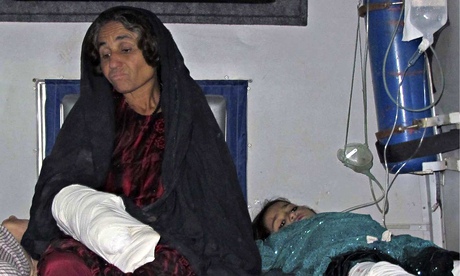Afghan police investigate fatal rocket attack on wedding party
At least 28 killed in apparent army strike day before Afghanistan takes full control of security at end of Nato combat operations

Associated Press in Lashkar Ga-
Afghan police are investigating an apparent army rocket strike on a wedding party that killed at least 28 people, many of them women and children.
Police in southern Helmand province were looking into how soldiers came to fire a rocket at a house where a wedding was being celebrated late on Wednesday, the deputy provincial police chief, Bacha Gull, said.
The rocket appeared to have been fired from an army checkpoint near the house in Sangin district as guests waited for the bride to arrive, he said.
Police were “keeping an eye” on two army checkpoints to determine whether the soldiers manning them were engaged in a firefight with Taliban insurgents at the time or whether they fired the rockets arbitrarily. The strike wounded 51 people.
Gull said the funerals, usually held within 24 hours of a death, had been delayed to enable investigators to determine the cause of the rocket strike.

Sangin, in the poppy-producing Helmand river valley, has been the scene of fighting between government forces and Taliban in the last six months since US forces left.
The international mission to rid Afghanistan of insurgents under the leadership of the US and Nato officially ended on 31 December. Afghanistan takes full responsibility for its own security from Thursday.
In a televised address, President Ashraf Ghani marked the transition by calling on Afghans to support their security forces in the interests of building a strong and peaceful country.
“If, a year ago today, you had listened to regional and international analysts, they would never have thought that today would happen,” he said. “They were thinking: ‘How can a country with the problems that Afghanistan has successfully complete a security and political transition?’”
